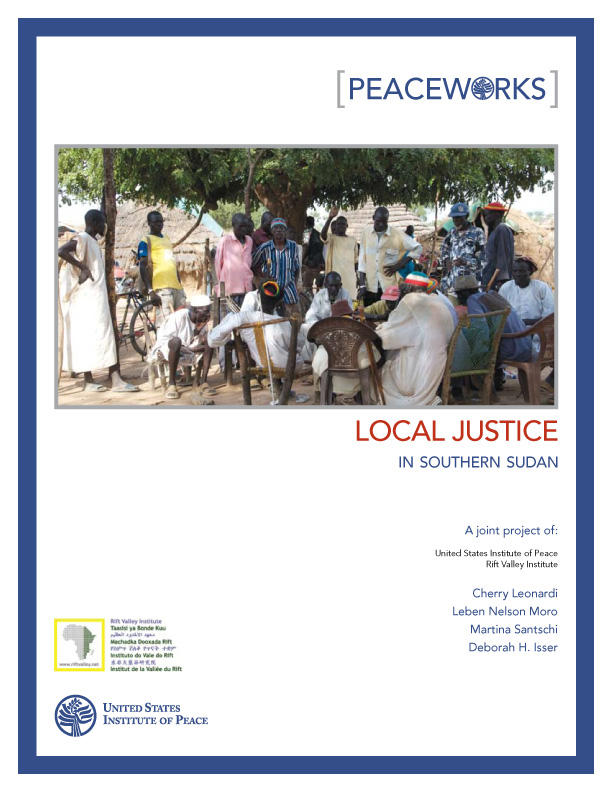This study is the result of collaboration between the United States Institute of Peace and the Rift Valley Institute (RVI), leveraging the former’s broader work on customary justice and legal pluralism and the latter’s extensive knowledge of the region. This report empirically analyzes the current dynamics of justice at the local level, identifying priorities for reform according to the expressed needs and perceptions of local litigants.

Summary
- Since its establishment five years ago under the Comprehensive Peace Agreement (CPA), the Government of Southern Sudan (GoSS) has struggled to create a justice system that reflects the values and requirements for justice among the people of Southern Sudan. For both political and practical reasons, chiefs’ courts and customary law are central to this endeavor. A key question facing the GoSS is how to define the relationship between chiefs’ courts (and the ideas about law that they embody) and the courts of Southern Sudan’s judiciary, while ensuring equal access to justice and the protection of human rights.
- Policy discussions and recent interventions have focused on ascertainment, whereby the customary laws of communities (usually defined as ethnic groups) would be identified and recorded in written form, to become the basis for the direct application, harmonization, and modification of customary law.
- This report empirically analyzes the current dynamics of justice at the local level, identifying priorities for reform according to the expressed needs and perceptions of local litigants. Our findings are based on field research conducted from November 2009 to January 2010 in three locations in Southern Sudan: Aweil East, Wau, and Kajokeji.
About the Report
This study is the result of collaboration between the United States Institute of Peace and the Rift Valley Institute (RVI), leveraging the former’s broader work on customary justice and legal pluralism and the latter’s extensive knowledge of the region. The overall concept and methodology was developed jointly by Cherry Leonardi of Durham University, Deborah Isser of USIP, and John Ryle of RVI. Dr. Leonardi was also director of the research team and lead author of the report, and she conducted field work in Wau and Jur River Counties. Dr. Leben Moro and Martina Santschi led the research in Kajokeji County and Aweil East County, respectively.
Members of the Northern Bahr el Ghazal, Western Bahr el Ghazal, and Central Equatoria State governments; the Aweil East, Wau, Jur River, and Kajokeji County governments; and the state and county judiciaries permitted and assisted the research.
Chiefs, judges, and court members allowed observation of their court sessions and gave extensive interviews. Garang Malong Akec, Mareng Chuor Deng, Garang Ajou Akue, Clement Morba, Silverio Abdallah, Kon Mawien, Christina Uwö, Benayi Lubang Muke, and Wilson Lubang Kwori assisted and translated for the research team. Tim Luccaro of USIP and Kit Kidner and Nick Daniels of RVI, among others, managed the logistical aspects of the project.